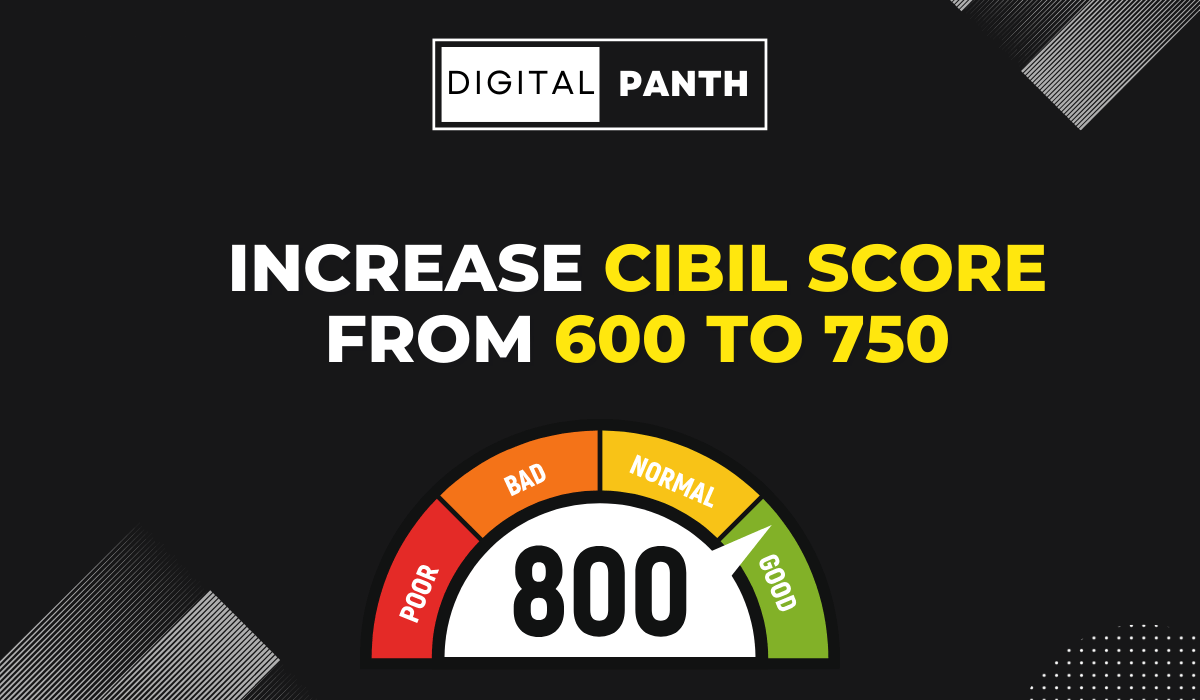How to Increase CIBIL Score From 600 to 750? You will likely be authorized for a loan based on your CIBIL score, sometimes known as your credit score. Your credit history, which includes previous credit obtained and related payment patterns, is used to calculate your CIBIL score. A high score indicates good creditworthiness, whereas a low score shows poor creditworthiness. If you have low credit ratings, lenders will view you as a risky borrower and are less likely to approve your loan application.
Read: How to Increase EMI of HDFC Home Loan?
Read: How To Close RBL Credit Card Permanently?
The Credit Information Bureau (India) Limited, also known as CIBIL, is an important factor in providing credit reports for each person. A CIBIL score is a three-digit number that is linked to a specific person and represents how that person has handled his credit. Now, credit comes in a variety of shapes and sizes, including credit cards, personal loans, EMIs, and home loans.
Importance of the CIBIL Score
Your repayment history is reflected in your CIBIL score, which also determines whether you qualify for additional loans. Due to this, the CIBIL score is given a lot of weight when applying for credit cards and loans. Before determining whether you are trustworthy enough to receive the loan or not, the money lender will look at your CIBIL score as an eligibility factor. As a result, everyone and anybody must maintain a decent credit score.
A CIBIL score between 700 and 900 is typically regarded as a good score for the majority of use scenarios. In order to avoid falling below this limit, one must constantly monitor their CIBIL score and work to raise it. Some advantages of keeping a high CIBIL score are listed below:
- Your chances of getting a loan approved by a bank or NBFC increase with your credit score. This is because a higher CIBIL score will demonstrate your reliability in terms of loan repayment, which will make it simpler for the lender to distribute the funds.
- Receiving reduced interest rates when selecting a particular loan is another advantage of maintaining a good CIBIL score. The type and structure of the loan will determine this, but having a solid credit score increases your chances of taking advantage of these opportunities.
- A person with a high credit score will have an easier time getting their loan applications approved. Anything that can speed up the loan application process is a good credit score because it can be a drawn-out and tiresome procedure without a good CIBIL score.
- If you have a higher CIBIL score, you can take advantage of further profitable reductions on processing fees and other fees.
As a result, we now know why everyone should make maintaining a strong CIBIL score a priority. It is obvious that having a good credit score gives you advantages over other borrowers and helps you build confidence with lenders.
Tips to Increase CIBIL Score 600 to 700
A person’s ability to obtain finance may be determined by his CIBIL scores. In order to keep track of your payments, the scoring algorithm consults a database of your recent credit history. The chances of obtaining a loan are increased with a higher score. Lenders could refuse you as a borrower if you have a low score since you appear to be a risky borrower.
You can use the following wise advice to Increase CIBIL Score from 600 to 750:
1- Avoid Cancelling Old Credit Cards.
A credit card is not automatically deactivated. Having old credit cards without any outstanding personal debts is a gift. To Increase CIBIL Score, hang onto any old credit cards you may have.
2- Refrain from often Checking Your Credit Card Scores.
Regularly reviewing your credit report is generally seen as bad for your CIBIL score. People should realize that there are two ways to pull CIBIL, though. Pulling might be soft or hard.
Your CIBIL score always decreases as a result of the ongoing hard pull. Online CIBIL information checks are referred to as soft pulls. Hard pulls are made by lending institutions or credit card firms to examine a borrower’s credit record. When you submit an application for new credit, hard pulls are created.
Your CIBIL score may be negatively impacted by persistent, multiple hard pulls. Therefore, it is advised to refrain from taking out personal loans or any other kind of loan regularly to prevent the creation of difficult queries. Therefore, use a soft pull whenever checking the status of CIBIL.
3- Pay Your Credit Card Bills Promptly.
Before requesting a new loan, pay off any outstanding bills. A person’s credit score will suffer if he doesn’t make his payments. It represents a collaborative effort to coordinate their financial approach. The technology may allow for automatic credit card payments or serve as a reminder for users who have missed payments.
4- Steer Clear of Taking on Excessive Debt at Once.
The credit score of the individual will be preserved by repayments. Taking out several loans at once indicates that your financial situation has grown intolerable. Your score can be further penalized as a result. On the other hand, borrowing while having a solid payback history raises a person’s credit score.
5- High Credit Limit Use
Your credit limits may be reduced in some cases if you are using more than 80% of your available credit. Your credit limit restricts your spending and is determined by your income. A credit card limit that is more than 50% can signify recklessness and a lower CIBIL score.
6- When Taking Out a Loan, Choose One with a Longer Term.
When times are rough economically, you have the choice to employ extended-term loans to prevent missed payments or loan default. Additionally, the long-term loan makes it simple for you to obtain money and promotes financial savings. If it helps, getting a mortgage with a longer term could potentially improve your CIBIL ratings.
7- Pay Off Old Debt First
Before requesting a new loan, pay off any outstanding bills. As loans are taken out and interest rates rise, the credit score will also rise and fall.
8- Automate EMI Payments
It’s a good idea to set up an auto-debit option for EMI deductions each month. The cash will be automatically debited on the designated date, saving you the burden of paying the EMIs manually. The possibility of failing to receive EMIs or causing delays will be reduced to zero.
9- Select a Variety of Credit Options.
People should diversify their credit portfolios to improve their credit scores. Long-term and short-term secured and unsecured loans should be distributed in a reasonable ratio. The holders of the loans should have the money available to make the repayments when there are too many loans that need to be paid. If an existing debt is due, the loan must be calculated before applying for additional financing.
10- Be Disciplined With Credit and Set Reminders for Payments.
Be diligent with credit and set reminders for payments. Your credit report may be impacted by repaying unpaid debts. In order to avoid debt, pay EMIs on time and in full. In addition to incurring penalties, EMI repayment delays might harm your credit scores. To avoid any issues and ensure that they are handled appropriately, retain a reminder of your payments.
11- Keep an Eye on Your CIBIL Report
You must keep track of every debt you pay off according to CIBIL requirements. It can be used to keep track of discrepancies in current credit reports. Regular CIBIL scoring enables fast error reporting and stops your score from dropping.
12- Pay Attention to Joint Loan Applications.
You must monitor your partner’s expenditures when you have joint debts. Their impulsive spending patterns may have an impact on both of your CIBIL scores. Furthermore, if you skip a payment, your CIBIL score drops. As a result, selecting a partner should be done carefully before completing a joint loan application.
Conclusion
You are responsible for handling your credit score. To maintain or Increase CIBIL Score, you need to make a small but systematic effort.
Additionally, it’s imperative to constantly check your score to see if it’s improving or staying the same. Most methods for raising your credit ratings have been discussed, along with some fundamental strategies for maintaining them.

